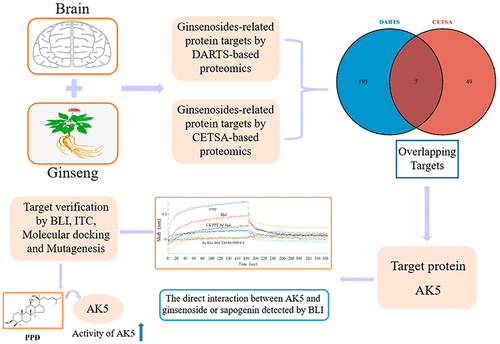当前位置:
X-MOL 学术
›
J. Agric. Food Chem.
›
论文详情
Our official English website, www.x-mol.net, welcomes your
feedback! (Note: you will need to create a separate account there.)
Identification of Adenylate Kinase 5 as a Protein Target of Ginsenosides in Brain Tissues Using Mass Spectrometry-Based Drug Affinity Responsive Target Stability (DARTS) and Cellular Thermal Shift Assay (CETSA) Techniques
Journal of Agricultural and Food Chemistry ( IF 5.7 ) Pub Date : 2022-02-19 , DOI: 10.1021/acs.jafc.1c07819 Feiyan Chen 1 , Chu Li 2 , Huiying Cao 2 , Hantao Zhang 3 , Cai Lu 4 , Ruimei Li 3 , Zhu Zhu 2 , Lin Chen 3 , Yunan Zhao 2
Journal of Agricultural and Food Chemistry ( IF 5.7 ) Pub Date : 2022-02-19 , DOI: 10.1021/acs.jafc.1c07819 Feiyan Chen 1 , Chu Li 2 , Huiying Cao 2 , Hantao Zhang 3 , Cai Lu 4 , Ruimei Li 3 , Zhu Zhu 2 , Lin Chen 3 , Yunan Zhao 2
Affiliation

|
Ginseng is a very famous Chinese herbal medicine with various pharmacological effects. Ginsenosides, the main effective compounds of ginseng, show favorable biological activities in the central nervous system (CNS), but the protein targets of ginsenosides in brain tissues have not been clarified clearly. First, we screened proteins that interact with ginsenosides by mass spectrometry-based drug affinity responsive target stability (DARTS) and cellular thermal shift assay (CETSA). Then, we identified and confirmed adenylate kinase 5 (AK5) as a target protein of ginsenosides by biolayer interferometry (BLI), isothermal titration calorimetry (ITC), and molecular docking. Finally, an enzyme activity kit was used to determine the effect of 20(S)-protopanaxadiol (PPD), a ginseng saponin metabolite, on AK5 activities in vivo and in vitro. We screened out seven overlapping target proteins by proteomics of DARTS and CETSA. The BLI direct action assays showed that the direct interaction of PPD with AK5 was higher compared to the parental ginsenosides. Subsequently, BLI kinetic analysis and ITC assay showed that PPD specifically bound to AK5. Furthermore, key amino acid mutations predicted by molecular docking decreased the affinity between PPD and AK5. Enzyme activity assays showed that PPD increased AK5 activities in vivo and in vitro. The above-mentioned findings indicated that AK5 is a protein target of ginsenoside in the brain and PPD is considered to be a small-molecular activator of AK5, which can improve comprehension of the molecular mechanisms of ginseng pharmacological effects in the CNS and further develop AK5 activators based on the dammarane-type triterpenoid structure.
中文翻译:

使用基于质谱的药物亲和力响应靶稳定性 (DARTS) 和细胞热位移测定 (CETSA) 技术鉴定腺苷酸激酶 5 作为脑组织中人参皂苷的蛋白质靶标
人参是一种非常有名的中草药,具有多种药理作用。人参的主要有效成分人参皂甙在中枢神经系统(CNS)中表现出良好的生物活性,但人参皂甙在脑组织中的蛋白质靶点尚未明确。首先,我们通过基于质谱的药物亲和反应靶稳定性 (DARTS) 和细胞热位移测定 (CETSA) 筛选与人参皂苷相互作用的蛋白质。然后,我们通过生物层干涉法 (BLI)、等温滴定量热法 (ITC) 和分子对接法鉴定并确认腺苷酸激酶 5 (AK5) 是人参皂苷的靶蛋白。最后用酶活性试剂盒测定20( S)-protopanaxadiol (PPD),一种人参皂苷代谢物,在体内和体外对 AK5 活性的影响。我们通过 DARTS 和 CETSA 的蛋白质组学筛选出七种重叠的靶蛋白。BLI 直接作用测定表明,与亲本人参皂苷相比,PPD 与 AK5 的直接相互作用更高。随后,BLI 动力学分析和 ITC 分析表明 PPD 与 AK5 特异性结合。此外,通过分子对接预测的关键氨基酸突变降低了 PPD 和 AK5 之间的亲和力。酶活性测定表明,PPD在体内和体外增加 AK5 活性. 上述研究结果表明,AK5是人参皂苷在脑中的靶蛋白,PPD被认为是AK5的小分子激活剂,可提高对人参在中枢神经系统药理作用分子机制的理解,进一步开发AK5。基于达玛烷型三萜结构的活化剂。
更新日期:2022-02-19
中文翻译:

使用基于质谱的药物亲和力响应靶稳定性 (DARTS) 和细胞热位移测定 (CETSA) 技术鉴定腺苷酸激酶 5 作为脑组织中人参皂苷的蛋白质靶标
人参是一种非常有名的中草药,具有多种药理作用。人参的主要有效成分人参皂甙在中枢神经系统(CNS)中表现出良好的生物活性,但人参皂甙在脑组织中的蛋白质靶点尚未明确。首先,我们通过基于质谱的药物亲和反应靶稳定性 (DARTS) 和细胞热位移测定 (CETSA) 筛选与人参皂苷相互作用的蛋白质。然后,我们通过生物层干涉法 (BLI)、等温滴定量热法 (ITC) 和分子对接法鉴定并确认腺苷酸激酶 5 (AK5) 是人参皂苷的靶蛋白。最后用酶活性试剂盒测定20( S)-protopanaxadiol (PPD),一种人参皂苷代谢物,在体内和体外对 AK5 活性的影响。我们通过 DARTS 和 CETSA 的蛋白质组学筛选出七种重叠的靶蛋白。BLI 直接作用测定表明,与亲本人参皂苷相比,PPD 与 AK5 的直接相互作用更高。随后,BLI 动力学分析和 ITC 分析表明 PPD 与 AK5 特异性结合。此外,通过分子对接预测的关键氨基酸突变降低了 PPD 和 AK5 之间的亲和力。酶活性测定表明,PPD在体内和体外增加 AK5 活性. 上述研究结果表明,AK5是人参皂苷在脑中的靶蛋白,PPD被认为是AK5的小分子激活剂,可提高对人参在中枢神经系统药理作用分子机制的理解,进一步开发AK5。基于达玛烷型三萜结构的活化剂。






























 京公网安备 11010802027423号
京公网安备 11010802027423号